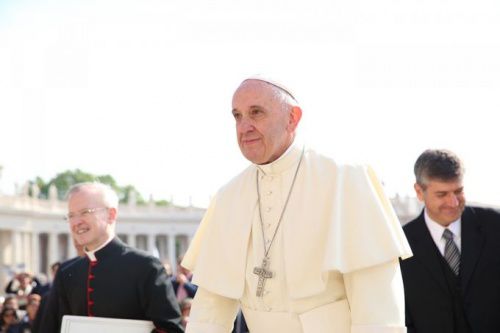In a wide-ranging question and answer session on Saturday, Pope Francis said it is “reductionism” to describe the violence against Christians in the world; the correct word, he said, is persecution.
“I want to say clearly, I do not like it when one speaks of a genocide of Christians, for instance in the Middle East,” the Pope said. “This is reductionism! The truth is a persecution which leads Christians to have fidelity to the consistency of their faith.”
This “sociological reductionism” does not apply to “that which is a mystery of the faith, the martyr!”
Francis made this remarks during his June 18 visit to the Villa Nazareth University College in Rome, during which he answered seven questions put to him by students on topics ranging from Christian persecution, to the economy, to being witnesses of the Gospel message.
Addressing the issue of persecution during his evening visit to the campus, the Pope recalled the Coptic Christian martyrs who were killed on the beach in Libya, all of whom died saying “Jesus, help me!”
While it was unlikely that these men were well-versed in theology, they nonetheless “were witnesses of the faith,” the pontiff said.
However, such a bloody martyrdom -- as heroic as it is -- is not the only way of giving witness to the faith, the Pope said.
Such martyrdom can be demonstrated everyday through honesty, the patient education of children, faithfulness to love, etc.
Francis also praised the “martyrdom” of resisting the temptation to gossip, which he compared to a “terrorist bomb.”
“The Christian witness is the martyrdom of every day, the martyrdom to remain silent.” However, there is nonetheless joy in Jesus’ word, “like those on the beach of Libya . . . it takes courage! And courage is a gift of the Holy Spirit.”
“Courage and patience” are two words St. Paul uses to describe the life of the Christian martyr, the Pope said: “the courage to go forward,” unashamed of being Christian, and with “the patience to carry the weight of every day,” including our own sufferings, sins, and instabilities.
Pope Francis went on to stress the need for awareness of our sins in order to be healed by Christ.
“We are sinners! Jesus has loved us, has healed us -- or, we are on the road to healing, always.”
Answering another question, Pope Francis spoke about the notion of gratuity -- the practice of giving to others what we have received -- which he said is in “danger of disappearing.”
Gratuity, the Pope said, stands against “individual gratification,” and the “culture of hedonism.”
He made the distinction between working and taking advantage of others: in the “culture of work in many underdeveloped countries, there is the subsidy culture which helps, but does not teach (people) to work,” he said.
St. Don Bosco, in contrast, worked with the poor living on the streets of Turin, and taught them basic skills to help them enter the workforce, he observed.
“Work resembles God. It resembles God who is creator, the craftsman,” the pontiff said. It is a vocation in which we do not remain stalled, but move forward.
Addressing the question put by one student about the need for a “credible witness” amid the complexities of life, Francis challenged them to have the courage to take risks.
The need for a credible witness is “the logic of the Gospel: to give witness with your own life, in your way of living, in the choices made,” the Pope said. It is the “witness of us Christians, of Jesus Christ who is alive, who has accompanied us in suffering, has died for us but now lives.”
The way to confront the challenges in the spheres of education and the emotional life is to have the courage to take risks, the pontiff said.
“Take risks! He who does not take risks does not walk,” yet “you make more mistakes if you remain stationary,” he said.
The Pope emphasized the importance of risk-taking, of getting our hands dirty like the Good Samaritan in the Gospel parable. “When we are in a life that is more or less calm, there is always the temptation of paralysis.”
Another question addressed the economic crisis, which has been exacerbated by migration and the widespread shifting of demographics. In his answer, Pope Francis decried the culture which centers around a “god of money,” as well as the sale of arms which forces the mass migration currently being witnessed.
In answer to a separate question, the Pope stressed the need for Christian communities to be more welcoming.
“We are living in a civilization of locked doors and closed hearts. We defend ourselves from each other. This is mine. This is mine. Afraid to accept, afraid to accept…”
This need to welcome does not only regard migrants, the pontiff stressed, but on a daily capacity.
“A church with a closed door is a sign that the Christian community has a closed heart; it is locked up in itself. We must regain a sense of welcome.”
Other topics addressed during the Q&A, which lasted about an hour included the effects of the “culture of the temporary” with regard to marriage, and a challenge to communities to now allow divisions among them.

